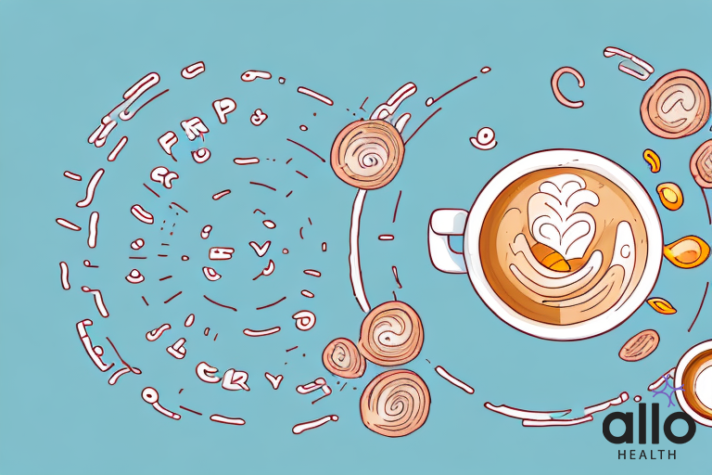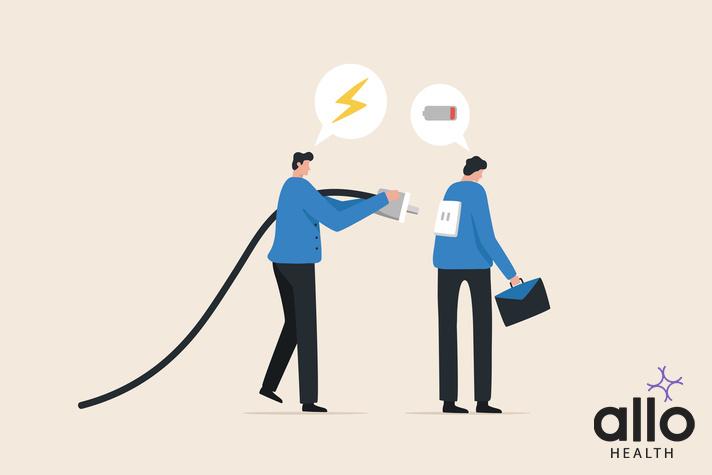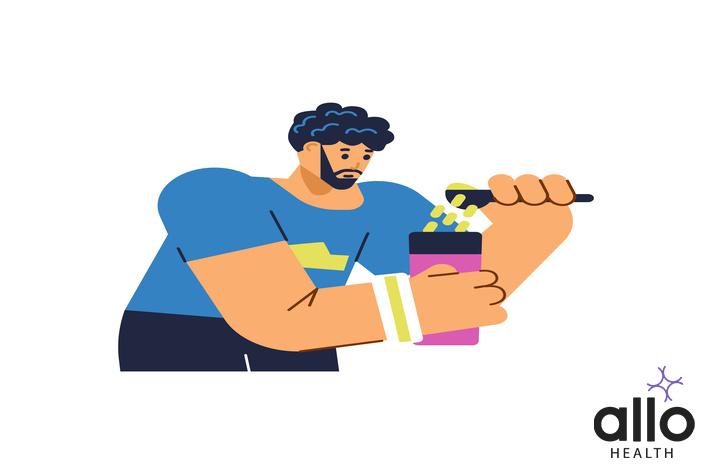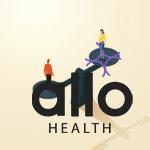How to Regain Energy After Ejaculation: Tips to Recharge Your Body

Allo Health is dedicated to personalized well-being, offering support and trusted information tailored to individual health goals. The platform emphasizes human-generated content, led by a distinguished medical team of experts, including physicians and sexual health specialists. Their commitment to credibility involves rigorous fact-checking, authoritative research, and continuous updates to ensure accurate, up-to-date information. Allo Health's unique approach goes beyond conventional platforms, providing expert-led insights and a continuous commitment to excellence, with user feedback playing a crucial role in shaping the platform's authoritative voice.

Dr. Aditi completed her undergraduate medical education at AJIMS, Mangalore, after which she worked in multi-speciality hospitals with COVID patients and in the Pain and Palliative medicine department. Driven by her experiences, she developed a keen interest in psychiatry. Dr. Aditi believes that mental health is just as, if not more important, than physical health.
Why This Was Upated?
Our experts continually monitor the health and wellness space, and we update our articles when new information became available.
Updated on 23 May, 2024
- Article was updated as part of our commitment to diversity, equity, and inclusion.

"The following blog article provides general information and insights on various topics. However, it is important to note that the information presented is not intended as professional advice in any specific field or area. The content of this blog is for general educational and informational purposes only.
Book consultation
The content should not be interpreted as endorsement, recommendation, or guarantee of any product, service, or information mentioned. Readers are solely responsible for the decisions and actions they take based on the information provided in this blog. It is essential to exercise individual judgment, critical thinking, and personal responsibility when applying or implementing any information or suggestions discussed in the blog."
Ejaculation is a natural bodily function that occurs in most men, and while it’s an important part of reproductive health, it can leave you feeling drained and tired. If you’re looking to regain energy after ejaculation, there are a number of things you can do to recharge your body and mind. In this article, we’ll explore the science behind ejaculation and energy depletion, the importance of energy conservation, and ways to boost your energy levels naturally.
The Science Behind Ejaculation and Energy Depletion
Ejaculation and its potential effects on energy levels have been the subject of various discussions, but it’s important to note that scientific understanding in this area may vary, and not all claims are universally accepted. Here, I’ll provide an overview of the relevant aspects, but keep in mind that individual experiences may differ, and more research is needed in some areas.
- Physiology of Ejaculation:
- Ejaculation Process: Ejaculation is a complex physiological process involving the release of semen from the male reproductive system. It’s controlled by the nervous system, with signals from the brain triggering the release of semen from the penis.
- Energy Depletion Claims:
- Nutrient Content of Semen: Some proponents of energy conservation theories suggest that semen contains a significant amount of nutrients, including vitamins, minerals, and proteins. Therefore, frequent ejaculation might lead to a perceived loss of these nutrients, potentially contributing to feelings of fatigue.
- Hormonal Changes: It’s also theorized that ejaculation may lead to changes in hormone levels, specifically a temporary decrease in testosterone. Testosterone is associated with energy, libido, and overall well-being. However, studies on the impact of ejaculation on testosterone levels have yielded mixed results.
- Scientific Perspectives:
- Nutrient Content: While semen does contain various substances, the idea that the loss of these nutrients through ejaculation significantly affects energy levels is not well-supported by scientific evidence. The nutritional contribution of semen to the overall nutrient balance of the body is minimal.
- Testosterone Levels: Research on the immediate effects of ejaculation on testosterone levels is inconclusive. While some studies suggest a temporary decrease in testosterone after ejaculation, others find no significant changes. Moreover, any such changes tend to be short-lived, with testosterone levels returning to baseline within a relatively short period.
- Individual Variation:
- Psychological Factors: Individual experiences with ejaculation and energy levels can be influenced by psychological factors. Beliefs, expectations, and cultural attitudes may play a role in how individuals perceive the impact of ejaculation on their energy.
- Health and Lifestyle: Overall health, lifestyle factors, sleep quality, and diet can have a more substantial impact on energy levels than the act of ejaculation itself.
While there are claims suggesting a link between ejaculation and energy depletion, the scientific evidence supporting these notions is limited and often inconclusive. The impact of ejaculation on energy levels appears to vary among individuals, and other factors likely play a more significant role in overall well-being.

It’s essential to approach such discussions with a critical mindset and consider individual variability, as well as the broader context of health and lifestyle factors. If someone experiences persistent fatigue or concerns about their energy levels, it’s advisable to consult with a healthcare professional for a comprehensive assessment.
The Effects of Ejaculation on Your Body and Mind
Ejaculation is a physiological process with both short-term and long-term effects on the body and mind. It involves the release of semen from the male reproductive system and is associated with various physical and psychological changes. Here’s a detailed overview of the effects of ejaculation:
Short-Term Effects:
- Muscle Contractions: During ejaculation, rhythmic contractions occur in the muscles of the pelvic region, including the muscles surrounding the penis. These contractions propel semen through the urethra and out of the body.
- Hormonal Changes:
- Immediate hormonal changes include an increase in oxytocin, sometimes referred to as the “love hormone.” Oxytocin plays a role in bonding and social behavior.
- Some studies suggest a temporary decrease in testosterone levels immediately following ejaculation, although the long-term impact on testosterone levels is debated.
- Physical Sensations: Ejaculation is associated with pleasurable sensations and the release of tension built up during sexual arousal.
- Relaxation and Well-Being: Many individuals report a sense of relaxation and well-being after ejaculation, which is attributed to the release of neurotransmitters and endorphins, contributing to a post-orgasmic state known as the refractory period.
Long-Term Effects:
- Refractory Period: After ejaculation, there is a refractory period during which sexual arousal and the ability to achieve another erection and orgasm are temporarily reduced. The duration of this period varies among individuals and tends to increase with age.
- Potential Impact on Libido: Some individuals experience fluctuations in libido or sexual desire based on factors such as relationship dynamics, stress, and overall health. Frequent ejaculation does not necessarily lead to a decrease in libido for everyone.
- Hormonal Balance: Long-term hormonal balance is influenced by factors beyond individual instances of ejaculation. Overall health, lifestyle, and age play crucial roles in hormonal regulation.
Psychological Effects:
- Mood Enhancement: The release of endorphins during and after ejaculation can contribute to improved mood and feelings of relaxation. However, the extent of this mood enhancement varies among individuals.
- Stress Reduction: Sexual activity, including ejaculation, has been associated with stress reduction. The release of stress-relieving hormones and the overall pleasurable experience can contribute to relaxation.
- Psychological Satisfaction: For many individuals, sexual activity and ejaculation are components of a satisfying and fulfilling intimate relationship, contributing to overall psychological well-being.
Considerations:
- Individual Variation: Responses to ejaculation can vary widely among individuals. Factors such as age, health, relationship status, and personal preferences play a significant role.
- Cultural and Personal Beliefs: Cultural and personal beliefs about sexuality and ejaculation can influence how individuals perceive and experience these processes.
- Health Impact: In the absence of medical conditions, ejaculation is generally considered a normal and healthy part of sexual functioning. Concerns about the effects of ejaculation on health should be addressed with healthcare professionals.
Ejaculation has both short-term and long-term effects on the body and mind, including physiological responses, hormonal changes, and psychological satisfaction. While there are general patterns, individual experiences and perceptions of these effects can vary widely.
Cause For Low Energy After Ejaculation
Low energy after ejaculation is a subjective experience, and various factors can contribute to this feeling. While it’s essential to consider individual differences, here are some potential causes for low energy after ejaculation:
- Physiological Changes:
- Hormonal Fluctuations: Ejaculation can lead to changes in hormone levels, including a temporary decrease in testosterone. While these changes are usually short-lived, they might contribute to feelings of fatigue in some individuals.
- Dehydration: Ejaculation involves the release of fluids, and dehydration can follow. Lack of proper hydration can lead to a drop in energy levels. Replenishing fluids by drinking water is crucial for post-ejaculation recovery.
- Loss of Nutrients: Some theories suggest that the loss of nutrients in semen may contribute to a perceived energy depletion. However, the nutritional content of semen is relatively small compared to the overall nutrient balance in the body.
- Physical Exertion: Sexual activity itself can be physically demanding, and the exertion involved during intercourse and ejaculation may contribute to a temporary feeling of tiredness.
- Individual Variation: People vary in their responses to sexual activity. Some individuals may experience a more significant drop in energy levels after ejaculation than others. Factors such as age, health status, and overall fitness can contribute to individual variation.
- Post-Orgasmic Illness Syndrome (POIS): POIS is a rare condition characterized by a cluster of flu-like symptoms, including fatigue, following ejaculation. While the exact cause is not fully understood, it is considered a hypersensitivity or allergic-type reaction to components in semen.
- Psychological Factors: Mental and emotional factors, such as stress, anxiety, or guilt associated with sexual activity, can influence energy levels. Negative emotions or psychological distress may contribute to feelings of fatigue.
- Sleep Disruption: Sexual activity, particularly if it occurs close to bedtime, may affect sleep patterns. Disrupted or inadequate sleep can lead to increased feelings of tiredness.
- Underlying Health Conditions: Certain medical conditions, such as chronic fatigue syndrome, depression, or hormonal imbalances, could contribute to persistent low energy levels. If fatigue is a consistent concern, it’s crucial to consider underlying health factors.
- Lifestyle Factors: Poor lifestyle habits, including a sedentary lifestyle, inadequate nutrition, or excessive use of stimulants, can contribute to low energy levels. Addressing overall health and wellness is essential for sustained energy.
- Relationship Dynamics: The dynamics of the relationship and sexual satisfaction can impact post-ejaculation feelings. Open communication and a healthy relationship can positively influence overall well-being.
- Recovery Time: Some individuals may not allow sufficient time for recovery after ejaculation. Balancing sexual activity with adequate rest and self-care is essential for maintaining energy levels.
Understanding the potential causes of low energy after ejaculation is a complex process, and it’s crucial to consider a holistic approach, including physical, psychological, and lifestyle factors. If concerns persist, seeking advice from a healthcare professional is advisable to rule out any underlying health concerns.

How to Regain Energy After Ejaculation: Tips to Recharge Your Body
Regaining energy after ejaculation involves a combination of physical, mental, and lifestyle practices. While the impact of ejaculation on energy levels can vary among individuals, here are some general tips that may help in promoting a sense of recovery and well-being:
- Hydration: Dehydration can contribute to feelings of fatigue. Drinking water helps replenish fluids lost during ejaculation and supports overall bodily functions.
- Nutrient-Rich Diet: Consume a balanced diet rich in vitamins, minerals, and essential nutrients. Include whole foods such as fruits, vegetables, lean proteins, and whole grains to provide sustained energy.
- Rest and Sleep: Prioritize good sleep hygiene to ensure adequate rest. Aim for 7-9 hours of quality sleep per night. Sleep is crucial for overall recovery and energy restoration.
- Recovery Time: Allow your body time to recover after ejaculation. Recognize that there may be a refractory period during which physical arousal and energy levels might be temporarily reduced.
- Exercise: Engage in regular physical activity, as exercise has been shown to boost energy levels and enhance overall well-being. Both aerobic exercise and strength training can contribute to improved energy.
- Mindfulness and Relaxation Techniques: Practice mindfulness meditation, deep breathing, or progressive muscle relaxation to manage stress and promote relaxation. These techniques can help in restoring mental energy.
- Limit Stimulants: Reduce the consumption of stimulants such as caffeine and nicotine, especially in the hours leading up to sleep. Excessive stimulant intake can interfere with quality rest.
- Healthy Sexual Practices: If concerns about energy levels are related to sexual activity, maintaining a healthy and open communication with your partner can be beneficial. Understanding each other’s needs and finding a balance that works for both partners is crucial.
- Supplements (if needed): Consult with a healthcare professional before considering supplements, but certain nutrients, such as zinc and magnesium, play a role in sexual health and energy metabolism. If there are deficiencies, supplements may be recommended.
- Mental and Emotional Well-Being: Pay attention to your mental and emotional health. Engage in activities you enjoy, spend time with loved ones, and seek support if needed. A positive mental state contributes to overall energy and vitality.
- Avoid Overconsumption: Overeating, excessive alcohol consumption, and other forms of overindulgence can contribute to feelings of sluggishness. Moderation is key to maintaining energy levels.
- Hormone Balance: If concerns persist, consult with a healthcare professional to assess hormone levels. Hormonal imbalances can impact energy, mood, and overall well-being.
- Time Management: Efficient time management and setting realistic priorities can help reduce stress and prevent burnout, contributing to sustained energy levels.
Remember, individual responses to ejaculation and energy recovery can vary, and these tips are general recommendations. If persistent fatigue or other health concerns are affecting your well-being, it’s advisable to consult with a healthcare professional for personalized advice and guidance.
Most Asked Questions
-
Why do I experience tired after ejaculation, and how can I regain power quick?
Ejaculation triggers a series of physiological responses, such as the release of hormones and neurotransmitters. While this method may be energetically annoying, feeling worn-out afterward is regularly transient. To regain power unexpectedly, cognizance on hydration, nourishing foods, and relaxation. Drinking water facilitates top off lost fluids, and a nutrient-wealthy weight-reduction plan helps usual well-being. Prioritize high-quality sleep to allow your frame to get better completely.
-
Can exercising assist raise my power levels after ejaculation?
Engaging in regular bodily hobby, inclusive of each cardio workout and power schooling, can certainly assist increase strength stages. Exercise complements move, releases endorphins, and promotes usual well-being. Aim for a balanced exercise recurring to revel in the tremendous results on each bodily and intellectual electricity.
-
Are there unique meals which can useful resource in recuperating energy submit-ejaculation?
Yes, a balanced weight loss plan with a focal point on whole foods can resource in energy healing. Incorporate fruits, veggies, lean proteins, and whole grains into your food. These ingredients offer critical vitamins and sustained energy. Avoid excessive stimulants and overeating, as they'll preclude the recuperation system.
-
Is there a advocated refractory period for most effective strength healing?
The refractory period, the time whilst physical arousal and energy stages may be briefly decreased after ejaculation, varies among people. It's critical to listen for your body and permit enough time for recuperation. Factors together with age and common fitness can affect the duration of this period.
-
Can mindfulness and rest techniques assist in regaining energy after ejaculation?
Yes, practices like mindfulness meditation and deep respiratory can make contributions to electricity restoration. These techniques assist manage pressure and sell relaxation, positively influencing mental and bodily well-being. Incorporating those practices into your routine can decorate your universal sense of power and assist in publish-ejaculation restoration.






































